- Home
- Robert Hugh Benson
Come Rack, Come Rope Page 12
Come Rack, Come Rope Read online
Page 12
“The——” began Marjorie, emboldened by the kindness of the priest’s voice.
“The bed of Procrustes, madam, was a bed to which all who lay upon it had to be conformed. Those that were too long were made short; and those that were too short were made long. It is a pleasant classical name for the rack.”
Marjorie caught her breath. But Father Campion went on smoothly.
“We shall have a clear day to-morrow, I think,” he said. “If you are at liberty, sir, and these ladies are not too wearied—I have a little business in Westminster; and——”
“Why, yes,” said Anthony, “for to-morrow night we expect friends. From Rheims, sir.”
The priest dropped his foot and leaned forward.
“From Rheims?” he said sharply.
The other nodded.
“Eight or ten at least will arrive. Not all are priests. One is a friend of our own from Derbyshire, who will not be made priest for five years yet.”
“I had not heard they were to come so soon,” said Father Campion. “And what a company of them!”
“There are a few of them who have been here before. Mr. Ballard is one of them.”
The priest was silent an instant.
“Mr. Ballard,” he said. “Ballard! Yes; he has been here before. He travels as Captain Fortescue, does he not? You are a friend of his?”
“Yes, sir.”
Father Campion made as if he would speak; but interrupted himself and was silent; and it seemed to Marjorie as if another mood was fallen on him. And presently they were talking again of London and its sights.
IV
In spite of her weariness, Marjorie could not sleep for an hour or two after she had gone to bed. It was an extraordinary experience to her to have fallen in, on the very night of her coming to London, with the one man whose name stood to her for all that was gallant in her faith. As she lay there, listening to the steady breathing of Alice, who knew no such tremors of romance, to the occasional stamp of a horse across the yard, and, once or twice, to voices and footsteps passing on some paved way between the houses, she rehearsed again and again to herself the tales she had heard of him.
Now and again she thought of Robin. She wondered whether he, too, one day (and not of necessity a far-distant day, since promotion came quickly in this war of faith), would occupy some post like that which this man held so gaily and so courageously; and for the first time, perhaps, she understood not in vision merely, but in sober thought, what the life of a priest in those days signified. Certainly she had met man after man before—she had entertained them often enough in her mother’s place, and had provided by her own wits for their security—men who went in peril of liberty and even of life; but here, within the walls of London, in this “wolves’ den” as Father Campion had called it, where men brushed against one another continually, and looked into a thousand faces a day, where patrols went noisily with lights and weapons, where the great Tower stood, where her Grace, the mistress of the wolves, had her dwelling—here, peril assumed another aspect, and pain and death another reality, from that which they presented on the wind-swept hills and the secret valleys of the country from which they came.… And it was with Father Campion himself, in his very flesh, that she had talked this evening—it was Father Campion who had given her that swift, kindly look of commendation, as Mr. Babington had spoken of her reason for coming to London, and of her hospitality to wandering priests—Father Campion, the Angel of the Church, was in England. And to-morrow Robin, too, would be here.
Then, as sleep began to come down on her tired and excited brain, and to form, as so often under such conditions, little visible images, even before the reason itself is lulled, there began to pass before her, first tiny and delicate pictures of what she had seen to-day—the low hills to the north of London, dull and dark below the heavy sky, but light immediately above the horizon as the sun sank down; the appearance of her horse’s ears—those ears and that tuft of wayward mane between them of which she had grown so weary; the lighted walls of the London streets; the monstrous shadows of the eaves; the flare of lights; the moving figures—these came first; and then faces—Father Campion’s, smiling, with white teeth and narrowed eyes, bright against the dark chimney-breast; Alice’s serene features, framed in flaxen hair; and then, as sleep had all but conquered her, the imagination sent up one last idea, and a face came into being before her, so formless yet so full, so sinister, so fierce and so distorted, that she drew a sudden breath and sat up, trembling…
… Why had they spoken to her of Topcliffe? …
CHAPTER III
I
IT WAS a soft winter’s morning as the party came down the little slope towards the entrance-gate of the Tower next day. The rain last night had cleared the air, and the sun shone as through thin veils of haze, kindly and sweet. The river on the right was at high tide, and up from the water’s edge came the cries of the boatmen, pleasant and invigorating.
Here and there some personage had been pointed out to her by the trim, merry gentleman who walked by her side with his sword swinging. (Anthony went with his sister just behind, as they threaded their way through the crowded streets, and the two men-servants followed.) She saw a couple of City dignitaries in their furs, with stavesmen to clear their road; a little troop of the Queen’s horse, blazing with colour, under the command of a young officer who might have come straight from Romance. But she was more absorbed—or, rather, she returned every instant to the man who walked beside her with such an air and talked so loudly and cheerfully. Certainly, it seemed to her, his disguise was perfect, and himself the best part of it. She compared him in her mind with a couple of ministers, splendid and awful in their gowns and ruffs, whom they had met turning into one of the churches just now, and smiled at the comparison; and yet perhaps these were preachers too, and eloquent in their own fashion.
And now, here was the Tower—the end of all things, so far as London was concerned. Beyond it she saw the wide rolling hills, the bright reaches of the river, and the sparkle of Placentia, far away.
“Her Grace is at Westminster these days,” exclaimed the priest; “she is moving to Hampton Court in a day or two; so I doubt not we shall be able to go in and see a little. We shall see, at least, the outside of the Paradise where so many holy ones have lived and died. There are three or four of them here now; but the most of them are in the Fleet or the Marshalsea.”
Marjorie glanced at him. She did not understand.
“I mean Catholic prisoners, mistress. There are several of them in ward here, but we had better speak no names.”
He wheeled suddenly as they came out into the open and moved to the left.
“There is Tower Hill, mistress; where my lord Cardinal Fisher died, and Thomas More.”
Marjorie stopped short. But there was nothing great to see—only a rising ground, empty and bare, with a few trimmed trees; the ground was without grass; a few cobbled paths crossed this way and that.
“And here is the gateway,” he said, “whence they come out to glory.… And there on the right” (he swept his arm towards the river) “you may see, if you are fortunate, other criminals called pirates, hung there till they be covered by three tides.”
Still standing there, with Mr. Babington and his sister come up from behind, he began to relate the names of this tower and of that, in the great tumbled mass of buildings surmounted by the high keep. But Marjorie paid no great attention except with an effort: she was brooding rather on the amazing significance of all that she saw. It was under this gateway that the martyrs came; it was from those windows in that tower which the priest had named just now, that they had looked.… And this was Father Campion. She turned and watched him as he talked. He was dressed as he had been dressed last night, but with a small cloak thrown over his shoulders; he gesticulated freely and easily, pointing out this and that; now and again his eyes met hers, and there was nothing but a grave merriment in them.… Only once or twice his voice softened, as he spoke of t
hose great ones that had shown Catholics how both to die and live.
“And now,” he said, “with your permission I will go and speak to the guard, and see if we may have entrance.”
It was almost with terror that she saw him go—a solitary man, with a price on his head, straight up to those whose business it was to catch him—armed men, as she could see—she could even see the quilted jacks they wore—who, it may be, had talked of him in the guard-room only last night. But his air was so assured and so magnificent that even she began to understand how complete such a disguise might be; and she watched him speaking with the officer with a touch even of his own humour in her heart. Indeed, there was some truth in the charge of Jesuitry, after all!
Then the figure turned and beckoned, and they went forward.
II
A certain horror, in spite of herself and her company, fell on her as she passed beneath the solid stone vaulting, passed along beneath the towering wall, turned up from the water-gate, and came out into the wide court round which the Lieutenant’s lodgings, the little church, and the enormous White Tower itself are grouped. There was a space, not enclosed in any way, but situated within a web of paths, not far from the church, that caught her attention. She stood looking at it.
“Yes, mistress,” said the priest behind her. “That is the place of execution for those who die within the Tower—those usually of royal blood. My Lady Salisbury died there, and my Lady Jane Grey, and others.”
He laid his hand gently on her arm.
“You must not look so grave,” he said, “you must gape more. You are a country-cousin, madam.”
And she smiled in spite of herself, as she met his eyes.
“Tell me everything,” she said.
They went together nearer to the church, and faced about.
“We can see better from here,” he said.
Then he began.
First there was the Lieutenant’s lodging on the right. They must look well at that. Interviews had taken place there that had made history. (He mentioned a few names.) Then, further down on the right, beyond that corner round which they had come just now, was the famous water-gate, called “Traitors’ Gate,” through which passed those convicted of treason at Westminster, or, at least, those who were under grave suspicion. Such as these came, of course, by water, as prisoners on whose behalf a demonstration might perhaps be made if they came by land. So, at least, he understood was the reason of the custom.
“Her Grace herself once came that way,” he said with a twinkle. “Now she sends other folks in her stead.”
Then he pointed out more clearly the White Tower. It was there that the Council sat on affairs of importance.
“And it is there——” began Anthony harshly.
The priest turned to him, suddenly grave, as if in reproof.
“Yes,” he said softly. “It is there that the passion of the martyrs begins.”
Marjorie turned sharply.
“You mean——”
“Well,” he said, “it is there that the Council sits to examine prisoners both before and after the Question. They are taken downstairs to the Question, and brought back again after it. It was there that——”
He broke off.
“Who is this?” he said.
The court had been empty while they talked except that on the far side, beneath the towering cliff of the keep, a sentry went to and fro. But now another man had come into view, walking up from the way they themselves had come; and it would appear from the direction he took that he would pass within twenty or thirty yards of them. He was a tall man, dressed in sad-coloured clothes, with a felt hat on his head and the usual sword by his side. He was plainly something of a personage, for he walked easily and confidently. He was still some distance off; but it was possible to make out that he was sallowish in complexion, wore a trimmed beard, and had something of a long throat.
Father Campion stared at him a moment, and, as he stared, Marjorie heard Mr. Babington utter a sudden exclamation. Then the priest, with one quick glance at him, murmured something which Marjorie could not hear, and walked briskly off to meet the stranger.
“Come,” said Anthony in a sharp, low voice, “we must see the church.”
“Who is it?” whispered Mistress Alice, with even her serene face a little troubled.
For the first moment, as they walked towards the entrance of the church, Anthony said nothing. Then as they reached it, he said, in a tone quite low and yet full of suppressed passion of some kind, a name that Marjorie could not catch.
She turned before they went in, and looked again.
The priest was talking to the stranger, and was making gestures, as if asking for direction.
“Who is it, Mr. Babington?” she asked again as they went in. “I did not——”
“Topcliffe,” said Anthony.
III
“It appeared to me best to speak with him openly,” said the priest quietly, as they had waited ten minutes later on the wharf outside the Tower, while the men ran to make ready their boat. “I do not know why, but I suppose I am one of those who better like their danger in front than behind. I knew him at once; I have had him pointed out to me two or three times before. So I looked him in the eyes, and asked him whether some ladies from the country might be permitted to see the White Tower, and to whom we had best apply. He told me that was not his affair, and looked me up and down as he said it. And then he went his way to … the White Tower, where I doubt not he had business.”
“He said no more?” asked Anthony.
“No, he said no more. But I shall know him again better next time, and he me.”
As they drew nearer Westminster, it was with Marjorie as it had been when they came to the Tower. The priest was busy pointing out this or that building—the Palace towers, the Hall, the Abbey behind, and St. Margaret’s Church, as well as the smaller buildings of the Court, and the little town that lay round about. But she listened as she listened to the noise that came from the streets clear across the water, attending to it, yet scarcely distinguishing one thing from another, and forgetting each as soon as she heard it. She was thinking all the while of Robin, and of the man whose face she had seen, of his beard and his long throat. Well, at least, Robin was not yet a priest.…
The boat was already nearing the King’s Stairs at Westminster, when a new event happened that for a while distracted her.
The first they saw of it was the sight of a number of men and women running in a disorderly mob, calling out as they ran along the river-bank in the direction from Charing Old Cross towards Palace Yard. They appeared excited, but not by fear; and it was plain that something was taking place of which they wished to have a sight. As the priest stood up in the boat in order to have a clearer sight of what lay above the bank, three or four trumpet-calls of a peculiar melody rang out clear and distinct, echoed back by the walls round about, plainly audible above the rising noise of a crowd that, it seemed, must be gathering out of sight. The priest sat down again and his face was merry.
“You have come on a fortunate day, mistress,” he said to Marjorie. “First Topcliffe, and now her Grace; if we make haste we may see her pass by.”
“Her Grace?”
“She will be going to dinner in Whitehall, after having taken the air by the river. They will be passing the Abbey now. But she will not be in her supreme state; I am sorry for that.”
As they rowed in quickly over the last hundred yards that lay between them and the stairs, Marjorie listened to the priest as he described something of what the “supreme state” signified. He spoke of the long lines of carriages, filled with the ladies and the infirm, preceded by the pikemen, and the gentlemen pensioners carrying wands, and the knights followed by the heralds. Behind these, he said, came the officers of State immediately before the Queen’s carriage, and after her the guards of her person.
“But this will be but a tame affair,” he said. “I wish you could have seen a Progress, with the arches and t
he speeches and the declamations, and the heathen gods and goddesses that reign round our Eliza, when she will go to Ashridge or Havering. I have heard it said——”
And then the prow of the boat, turned deftly at the last instant, grated along the lowest stair, and the waterman was out to steady his craft.
IV
It was the very crown and summit of new sensation that Marjorie attained as she stood in an open gallery that looked on to the road from Westminster to Whitehall. Father Campion, speaking of a “good friend” of his that had his lodgings there, led them by a short turning or two, that avoided the crowd, straight to the door of what appeared to Marjorie a mere warren of rooms, stairs and passages. A grave little man, with a pen behind his ear, ran out upon their knocking at one of these doors, and led them straight through, smiling and talking, out into this very gallery where they now stood; and then vanished again.
The gallery was such as those which Marjorie had noted on the way to the Tower; a high-hung, airy place, running the length of the house, contrived on the level of the second floor, with the first floor roof beneath and overhanging attics above. It was supported on massive oak beams, and protected from the street by a low balustrade of a height to lean the elbows upon it. It was on this balustrade that Marjorie leaned, looking down into the street.
To the left the narrow roadway curved off out of sight in the direction of Palace Yard; on the right she could make out, a hundred yards away, some kind of a gateway, that strode across the street, and gave access, she supposed, to the Palace. Opposite, the windows were filled with faces, and an enthusiastic loyalist was leaning, red-faced and vociferous, calling to a friend in the crowd beneath, from a gallery corresponding to that from which the girl was looking.
Of the procession nothing was at present to be seen. They had caught a glimpse of colour somewhere to the east of the Abbey as they turned off opposite Westminster Hall; and already the cry of the trumpets and the increasing noise of a crowd out of sight told the listeners that they would not have long to wait.

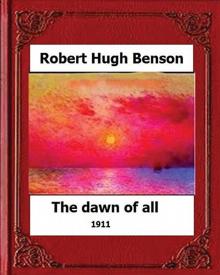 The Dawn of All
The Dawn of All By What Authority?
By What Authority?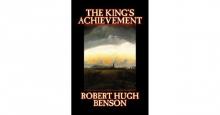 The King's Achievement
The King's Achievement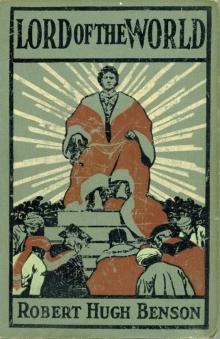 Lord of the World
Lord of the World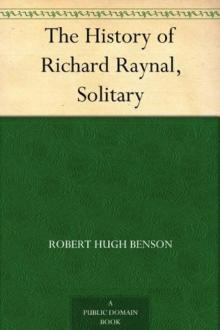 The History of Richard Raynal, Solitary
The History of Richard Raynal, Solitary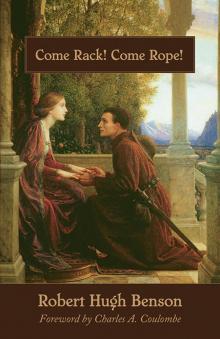 Come Rack, Come Rope
Come Rack, Come Rope